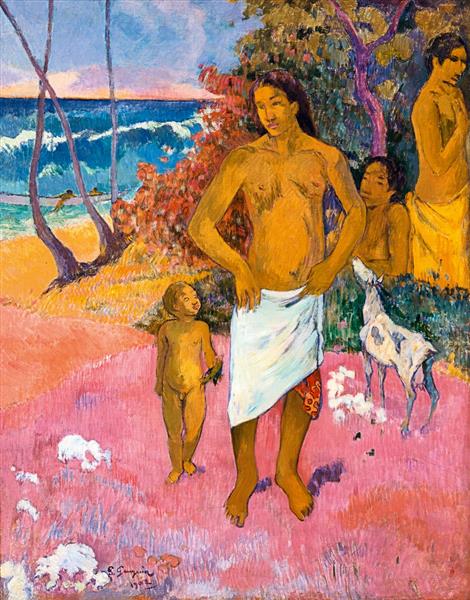Description
Paul Gauguin's Bathers (1902) is a vibrant testament to the evolution of modern art through its exploration of form, colour and the subject matter of tropical landscapes linked to the human figure. Created during his stay in Tahiti, this painting encapsulates the essence of Gauguin's quest for a style that transcends the representation of realism towards a deeper and more suggestive symbolism. Relatively small in size, this work makes a strong impression through its visual richness and thematic monumentality.
In the composition of "Bathers", one perceives a treatment of the figures that evokes the simplicity and, at the same time, the complexity of the human being in harmony with nature. Two female figures, in their almost sculptural delimitation, meet in an interaction that suggests both intimacy and a space for contemplation. These women, with features that are part of Gauguin's search for the primitive and elemental essence, seem to emerge from the landscape, blurring the boundaries between the human being and the natural. The robust bodies, with defined contours, contrast with the softer and more fluid environment of the vegetal elements that surround them.
Colour is one of the defining aspects of Gauguin’s innovative approach. His palette is intense and varied, oscillating between the warm tones of the bathers’ bodies and the vivid greens of the surrounding vegetation. The colours are applied using a technique that highlights textures, allowing the surface of the painting to be as evocative as the subject it depicts. The vibrant hues not only serve an aesthetic function, but also symbolise an emotional experience, suggesting the happiness, freedom and connection to nature that was central to Gauguin’s primitivist ideal.
The atmosphere of the painting is also enriched by the use of patterns and the arrangement of elements, which do not follow the rules of traditional perspective, but rather seem to move towards a two-dimensional plane that emphasizes the importance of color over form. This method aligns with symbolism and post-impressionist aesthetics, where the emotional and the subjective prevail over realistic representation. In "Bathers," Gauguin breaks with conventions, suggesting the possibility of a freer and more personal interpretation by the viewer.
The context in which Gauguin created this work is relevant to understanding its meaning. During his years in Tahiti, the artist was confronted with the complex reality of the colony and its inhabitants, while also being inspired by the local culture and worldview. "Bathers" can be seen as a reflection of his idealization of a primordial state that contrasts with the values of Western society at the time. Far from a mere idyllic landscape, the painting evokes the search for a space where humans and nature coexist in a perfect symphony, offering an implicit critique of the materialism of his time.
In conclusion, “Bathers” is not only a representative work of Paul Gauguin’s style, but it also encapsulates a pivotal moment in the evolution of modern art. It is a rich intersection of form, color, and symbolism that resonates with deep emotions and a primordial connection to nature, inviting the viewer to reflect on their own position in the world, in a dialogue that endures beyond simple aesthetic contemplation. The work invites a personal journey, providing those who observe it with an experience that goes beyond the visual, opening a space for philosophical and emotional contemplation.
KUADROS ©, a famous painting on your wall.
Hand-made oil painting reproductions, with the quality of professional artists and the distinctive seal of KUADROS ©.
Painting reproduction service with satisfaction guarantee. If you are not completely satisfied with the replica of your painting, we will refund 100% of your money.

